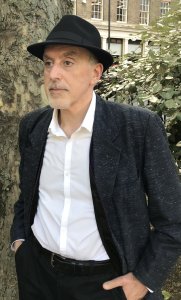Mario Petrucci is a multi-award-winning poet, freelance performer and academic, physicist, environmentalist, translator, educator and broadcaster, active with such radio outlets as Kaleidoscope, The Verb and the BBC World Service. His work is as profoundly moving as it is thought-provoking, shifting convincingly between lyric, performance, science, ecology, war and cultural memory. Notably, he was chosen by BBC News to compose a poem to be featured in its response to 9/11. He is also one of the earliest founders and proponents of Ecopoetry in the UK (e.g. Bosco, 1999).
Among Petrucci's publishers are Bloodaxe, Enitharmon, Arc, Nine Arches and Cinnamon, with titles that include the PBS Recommendation Shrapnel and Sheets (1996) and Flowers of Sulphur (2007). His epic 1111-poem sequence i tulips (2010) uniquely revivifies Anglo-American poetics, the Poetry Book Society recognising “a truly ambitious landmark body of work”. Endorsed by Roy Fisher and Bill Berkson, Petrucci's i tulips challenges his contemporaries to engage with his “energetic fusion of American and British modernism” (Poetry International). Meanwhile, as translator, Petrucci has brought into English universally applauded versions of Hafez, Rumi, Montale, Sappho, Catullus, and the Isha Upanishad, with Xenia (2016) receiving a PEN Translates Award and a shortlisting for the John Florio Prize.
22 national and international competition wins between 1991 and 2005 include the Bridport Prize, Irish Times Perpetual Trophy, and London Writers Competition (four times). Heavy Water: a poem for Chernobyl, winner of the Arvon Prize, was praised by The Daily Telegraph as “heartfelt, ambitious and alive”, and singled out by Verse (USA) as “poetry on a geological scale… a new track for poets of witness”. It fuelled two award-winning films, spurring a wide-reaching reassessment of the value of poetry in trauma and ethical discourse.
Formally inventive, his poetry ranges from the intimate to the monumental, from scientific and medical precision to metaphysical reach. His love poetry takes candour and metaphor to unprecedented heights, and depths, soaring — or plummeting — where few poets dare. Numerous institutional engagements include historic, first-ever poet-in-residence placements at BBC Radio 3 and the Imperial War Museum, while his 2012 Olympic centrepiece commission Tales from the Bridge (a vast 3D soundscape spanning the Thames) was shortlisted for the Ted Hughes Award and heard by over 4 million people.
A cross-disciplinary specialist who inventively combines poetry with science and the environment, both theoretically and in his poetry, Petrucci featured at the World Conference on Science and Art for Sustainability (Belgrade, 2025), flagship event of the United Nations’ Decade of Sciences for Sustainable Development. Founder of Writing Into Freedom, a Youtube channel and its sibling website offering free writing resources for all, he has developed groundbreaking frameworks for creative practice that couch a lively, liberating pedagogy within grassroots access and academic rigour.
Now widely recognised as among the most persistent and successful literary innovators of his generation, Petrucci's British Council appraisal is preserved in the UK Government Web Archive, and complete sets of his major works are lodged with key libraries globally, including Harvard, Berkeley, Buffalo, Poets House (New York), and the Library of Congress. He has so far composed over 3500 poems, of which about 1100 have appeared in print or been broadcast, along with approximately 200 published prose pieces. In 2023, Petrucci's entire literary archive was permanently acquired for preservation and research by the British Library. Two years later, the UK's renowned Poetry Archive secured and made public a substantial holding of his audio work.







